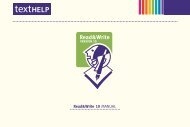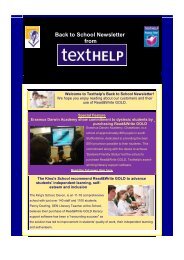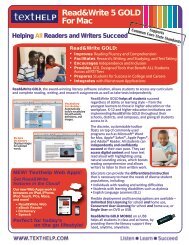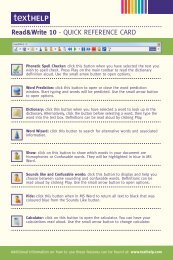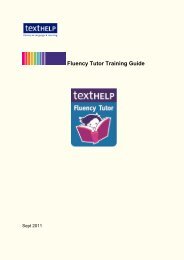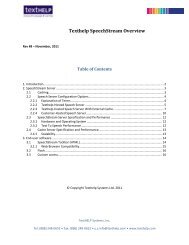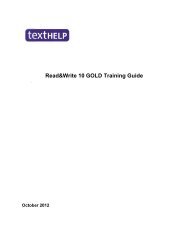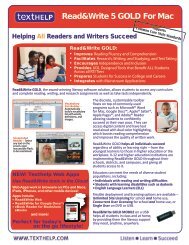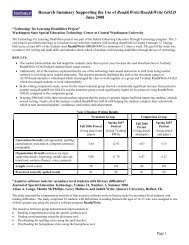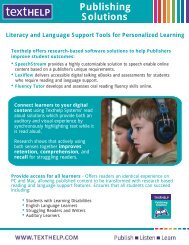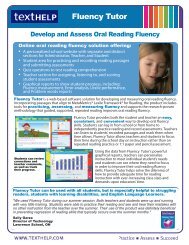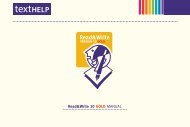01 NRDC Dyslexia 1-88 update - Texthelp
01 NRDC Dyslexia 1-88 update - Texthelp
01 NRDC Dyslexia 1-88 update - Texthelp
You also want an ePaper? Increase the reach of your titles
YUMPU automatically turns print PDFs into web optimized ePapers that Google loves.
Developmental dyslexia in adults: a research review 83<br />
years. Their measured IQs ranged from 94 to 135, with a mean of 106. They had been<br />
diagnosed as ‘learning disabled’ by means of various ability-achievement discrepancy criteria.<br />
In a summer school programme lasting for five weeks, ten of the students were taught by an<br />
‘alphabetic synthetic multisensory phonetic’ method incorporating alphabetic knowledge,<br />
letter sounds and blends, syllable division, directionality and simultaneous reading, spelling<br />
and handwriting.<br />
A comparison group of ten students was taught by a method which did not attempt to teach<br />
individual letter sounds or to integrate the teaching of spelling, reading and handwriting. A<br />
further group of ten students did not attend the summer school.<br />
Data analyses showed that the reading scores of the Orton-Gillingham group improved more<br />
over the programme period than those of the other two groups, with a mean improvement of<br />
approximately one and a half grades (or academic years).<br />
<strong>Dyslexia</strong> and psychodynamics: a case study of a dyslexic adult (Migden, 1990)<br />
The subject of this study was a 33 year-old with an IQ in the normal range. He had a history of<br />
alcoholism, emotional outbursts and difficulty in sustaining relationships with other people. He<br />
was dependent on his parents, with whom he lived, for help with literacy tasks. Previous<br />
interventions (including private tutors, optometric training, child psychotherapy and medical<br />
consultations) had been ineffective in helping him develop his literacy skills.<br />
Weekly psychotherapy ran concurrently with a twice-weekly literacy programme that involved<br />
use of a ‘speak and spell’ machine. To help the student to sublimate his aggressive impulses,<br />
his psychotherapist encouraged him to read books of two kinds: books on the problems of<br />
growing up with a disability, books about guns, rifles and weapons of war. Just as<br />
psychotherapy helped the student’s learning, it appeared that learning was helping his<br />
psychotherapy.<br />
The literacy programme ended after two years, when the student had attained his goals. He<br />
later earned a high school diploma and started a family of his own. The study endorses what<br />
might be intuitive: that students with multiple problems are most likely to make progress when<br />
all of those problems are being addressed. However, it also suggests that, no matter how<br />
understanding a basic skills tutor might be, she or he may need to collaborate with other<br />
professionals in helping students whose learning difficulties have caused problems in other<br />
aspects of their lives.<br />
Task-determined strategies of visual process (Geiger et al., 1992)<br />
These studies took place following the discovery that an atypical subgroup in a study of visual<br />
lateral masking had previous diagnoses of dyslexia. The purpose was to determine whether<br />
the information necessary for reading could be blunted by misuse of a normal visual process<br />
and whether any blunting could be relieved by suitably-designed practice in normal lateral<br />
masking strategies.<br />
The participants in the first study were ten ‘ordinary’ readers and ten with severe dyslexia. The<br />
‘ordinary readers’ were university students, while the dyslexics were volunteers from various<br />
backgrounds. After this study had confirmed that ordinary readers recognise letters best in and<br />
near the centre of gaze, whereas severe dyslexics recognise letters farther in the periphery in<br />
the direction of reading, an intervention study took place. An intervention case-study of a



